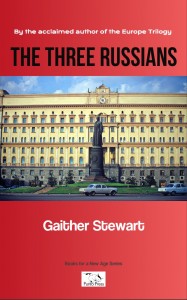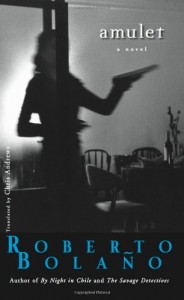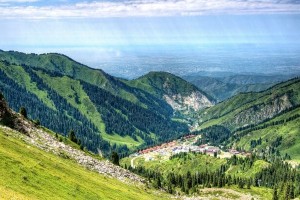=By= Gaither Stewart
(Extract from my Iranian diary; a Saturday in June, 1900s) Again, in the early morning, we had driven through the rugged Elburz Mountains from Tehran to the Caspian Sea, then west-northwest up the Caspian coast as far as Ramsar, and then doubled back east along the shore. I, the official interpreter, had wanted to head westwards for Tabriz and Azerbaijan, but the Italian businessmen were most eager to find a good fish restaurant. They entered the first place we saw. The Iranian-Armenian broker and I stood in silence at water’s edge. I was dreaming Caspian … and wondering about the distance to the northwest corner where the Volga River flows into this, the world’s largest enclosed body of water lined in the south by the Elburz and in the west by the great Caucasian mountains just out of our sight but whose presence we felt, range after range, peak after peak, crags and hidden streams. An impregnable fortress. The northern exposure here on the Iranian shores of the Caspian at the small town of Sulaleh is an enlightening geographical experience. We speak in the Armenian’s nearly native Russian as a result of his university studies in Yerevan, Armenia before his emigration to Iran. He points to the west to indicate his present home in Tabriz, Iran. Involuntarily, I mutter the names of cities on the western coast of the Caspian: oil-rich Baku in Azerbaijan (that today the U.S. so wants to get its hands on as it does on Armenia and occupy as it has their southern neighbor Georgia with all is wines and champagne.)I think of the North Caucasian Makhachkala, the capital of Russia’s Dagestan, occupied by the British during the Western intervention in the Russian civil war in 1919 before the city was occupied by the new Red Army in 1920. We speak of the genocide of the Armenians on Mt. Ararat perpetrated by the Turks. I tell him of my private Turkish language teachers, the first a Karachay from the confusing mix of peoples of the North Caucasus on the northen slopes of those great mountains; the second a real Kazakh from Kazakhstan. Both of their native languages are Turkic, transformed and consolidated in university studies in Turkey before their immigration to Germany. The engineer says I would like Tabriz where the street language is Azerbaijani Turkish, nearly Anatolian. My eyes shift to the eastern shores in search of the country of Turkmenistan before roaming northwards toward Kazakhstan. The huge Caspian Sea does look like a full-fledged sea. Yet only puny waves are rolling in, even though the southern part of the sea is said to reach over one thousand meters depth. Located between Europe and Asia the Caspian retains waters from the great Volga and Ural Rivers, the latter considered the dividing line between Europe and Asia. Hard to believe that it has no outflows. All its waters converge into surrounding lakes and swamps that nature equilibrates through evaporation. There was no chance to get to Kazakhstan over one thousand kilometers to the north and its flanks spread along the sea’s northeastern shores … but I felt it there. I do not tell the Iranian of my sensation of being very near the top of the world. I felt it was there, north of the Caspian, the top of the world, the center, where time perhaps stands still in which vacuum you perceive lies enormous power. The thing about this location on the Caspian is that you sense the presence of another world up there and that it has a core, the existence of which will one day surprise the world.
Continue reading »
 The Three Russians. Punto Press, June 2016. By Gaither Stewart
The Three Russians. Punto Press, June 2016. By Gaither Stewart


